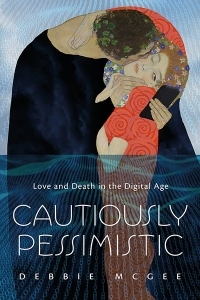Cautiously Pessimistic, by Debbie McGee

Cautiously Pessimistic is a lot of different things, as its subtitle (Love and Death in the Digital Age) implies. It’s a raw, honest memoir about a loving but in some ways unconventional marriage; it’s an equally raw and honest account of what it’s like to go from receiving your partner’s cancer diagnosis to saying goodbye to them within a period of eight months; it’s an exploration (often more implicit than explicit) of how living in the era of social media impacts the way we experience relationships, loss, and grief.
Debbie tells the wonderfully heartfelt story of how she met, fell in love with, fell out of love with, had a child with, got back together with, had another child with, and (much later) eventually married Gerry Porter. This aspect of the story is filled with scenes that evoke vivid memories for anyone who lived in St. John’s in the 1990s and was even peripherally aware of the downtown arts scene. It’s not just the deliciously gossipy name-dropping of people we either know or know of; it’s little details like Debbie mentioning a place where she and a friend went to eat, and the sudden shock of recognition: “I remember that restaurant! I’d forgotten it ever existed!” Even if you didn’t live in St. John’s, if you were once young, and fell in and out of love, and made a few bad decisions, and either lived, or wished you were living, an artsy bohemian lifestyle, you’ll relate to parts of this memoir.
The brilliance of this story is in not telling it chronologically — or rather, alternating one chronological story with another. Each time you finish a chapter in Debbie’s and Gerry’s turbulent youthful relationship, you find yourself in another chapter in which they are mature married people, parents of two grown sons, their comfortable life in retirement suddenly derailed by Gerry’s terminal cancer. The day-to-day realities of coping with this sudden and tremendous loss are brilliantly sketched here; these scenes feel real, and thoughtful, and as evocative as the early scenes of romance, for anyone who has experienced the loss of a loved one, especially to cancer.
Woven throughout the recent-past storyline of illness and death are excerpts from emails and social media posts, the real-time journals which hold the record of so many of our lives now. These excerpts include emails to and from family members, Facebook posts keeping a larger circle of friends and acquaintances informed, and, providing bright sparks of humour amid the sadness, quotes from Gerry Porter’s Twitter feed. I can’t remember if I ever interacted with Gerry on Twitter, but I’m sure I read his tweets, and they are emblematic of everything that was truly great and fun about the platform before it became the post-Elon dumpster fire it apparently is now (after living through and loving the glory days of Newfoundland Twitter, I finally left the place, as so many people have done). The greatness of Twitter in its heyday was the way a witty, insightful writer could leave you both laughing and shaking your head in recognition, all within 140 characters — and, as the excerpts in this book show, Gerry Porter was a master of the format.
The inclusion of social media excerpts in this book offers both the bright side and the dark side of our twenty-first century life: we see, for example, how planning a pre-death memorial service that Gerry himself could attend was facilitated by social media bringing these friends together. (This was the “Gerrypalooza,” which I remember seeing promoted by friends on Facebook; I didn’t know Gerry and had only met Debbie a couple of times professionally, but St. John’s is small enough and we had enough friends in common that I was definitely aware of this event long before reading about it in this book). However, in the Afterword, Debbie examines some of the downsides: the way even casual acquaintances will use a person’s death to centre themselves on social media, collecting sympathy for “their loss” while making the person’s partner and immediate family feel sidelined in the midst of their grief.
I actually think it would have been interesting to see a little more of this kind of analysis threaded throughout the book. This is the story of two people whose relationship started, as did those of most of us in our generation, long before social media or even cellphones were thought of — an era when, as happens early in this story, you could miss spending an evening with someone you were in love with, just because you happened not to be home when they called, and without the landline they had no way of knowing where you were. So many of the ups and downs of Debbie’s and Gerry’s early relationship that are chronicled here would have been so different in this age of social media gossip and constant connection, and it would have been interesting to see that explored a little more. But this book is already doing so much — and doing it so well — that to ask it to do more seems churlish.
This is a lovely, painful, bittersweet memoir. I highly recommend it.



